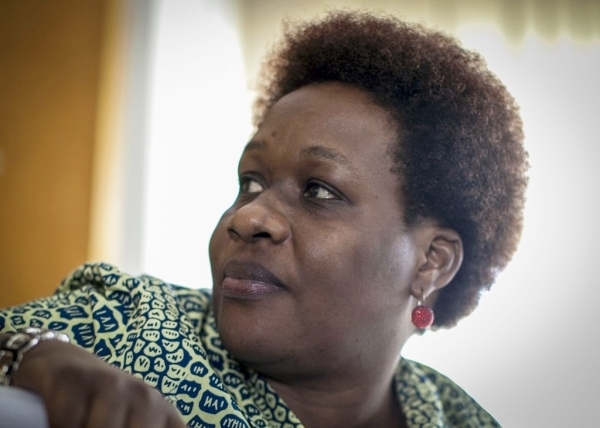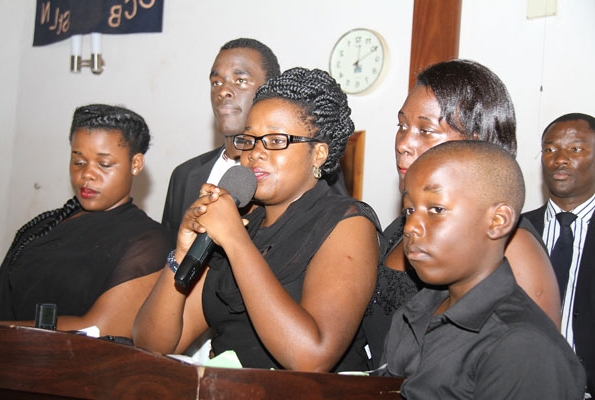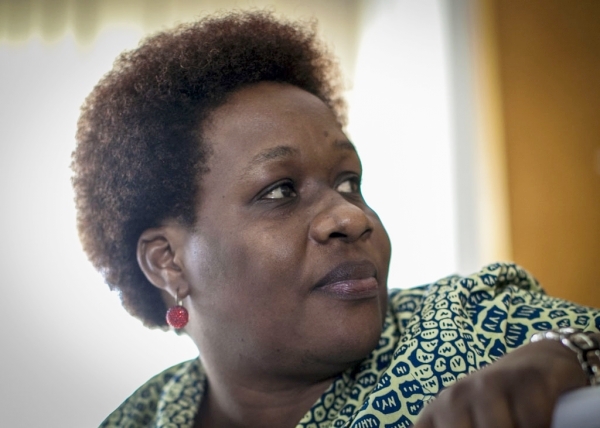
Joan Kagezi was a lead prosecutor in high profile cases in Uganda, including against a former LRA commander and those accused of terrorism. She was shot dead in front of her children in March.
By Brigid Inder | The AfricaPaper
Kampala, Uganda – On 30 March, at around 7.30pm, Joan Kagezi, Senior Principal State Attorney in Uganda, was murdered by unidentified assailants, who opened fire on her while she was driving home from work.
In the most ordinary of circumstances, Joan had stopped at a fruit stall on her way home when she was shot twice by gunmen on a motorcycle. Three of her four children were in the car with Joan at the time of the attack and witnessed the brutal murder of their mother.
Joan was head of the Directorate of Public Prosecution’s (DPP) war crimes and anti-terrorism division and in this capacity she was, at the time of her death, the lead Prosecutor in a high profile terrorism case, involving suspects in the 2010 terrorist bombings in Kampala. The case was strong and Joan was formidable.
Feeling Uncomfortable
Just a few days before her death, Joan had shared with a colleague that she had not liked the way one of the accused in the case was staring at her during a recent court session. She said she felt that he was looking at her in a menacing way and it made her feel uncomfortable. Earlier in the case she had asked the presiding judge to not allow the accused to sit in the public gallery but rather to have them seated together within the Court room. The Judge had refused her request stating that it would injure the health of the accused to do so.
Sharp Prosecutorial Mind

Joan Kagezi was a long-time friend of the Women’s Initiatives for Gender Justice. She was softly-spoken with a calm, unflappable demeanour which belied her steely and unswerving determination and her sharp prosecutorial mind. Working with Joan generated hope that post-conflict Uganda was on the right track and that its judicial system, although struggling, might rise to the challenge. Maybe our work together helped all of us believe that despite the longevity of the conflict and the pain, torment and suffering of multiple generations of northern Ugandans, justice, truth and reconciliation, or something akin to these aspirations, may yet be possible.
We met Joan in the course of our legal monitoring and advocacy work regarding prosecutions associated with the LRA-related conflict before the International Crimes Division (ICD) of the High Court of Uganda.
Kidnapping and Destruction
As head of the DPP’s war crimes and anti-terrorism division, Joan was the lead Prosecutor in the latter stages of the ICD case against Thomas Kwoyelo, a former commander of the Lord’s Resistance Army (LRA) who was charged with the war crimes of murder, attempted murder, kidnapping and destruction of property, amongst other acts. Notably, there were no charges for gender-based crimes in this case despite Kwoyelo’s rank within the LRA and the multiple sources describing the militia’s practice of assigning abducted girls and young women to commanders for sexual and domestic purposes. It is also noteworthy that no charges were brought under the Ugandan ICC Act although some of the incidents for which Kwoyelo is charged are also incidents which have been the subject of ICC investigations. We worked very closely with Joan on these issues. She was receptive to our advocacy and supportive of the inclusion of sexual and gender-based crimes in the ongoing investigative and prosecutorial priorities of the ICD. She informed us last year that she was hopeful that the next round of LRA-related cases would likely include charges for these crimes.
Amnesty for Ex-combatants
The larger challenge in the Kwoyelo case was his application to the Ugandan Amnesty Commission and potential eligibility to be pardoned under the Amnesty Act. More than 24,000 certificates of amnesty have been granted to ex-combatants under this act, and prior to the Kwoyelo case, no one who had applied for amnesty had been denied.
The Women’s Initiatives and our partners, especially the Greater North Women’s Voices for Peace Network (GNWVPN), have been persistently vocal in critiquing the failure of the Act to include amnesty conditions regarding requirements for: truth telling; a confession – individuals are not required to make a full declaration of the acts they had committed or the incidents they may have witnessed; the exclusion of certain crimes including sexual and gender-based violence from qualifying under the amnesty regime; and an apology to direct victims of their crimes and those in the broader community affected by their actions. In practice, the Amnesty Act has provided a blanket immunity from prosecution for sexual violence and other crimes, for the entire period of the Ugandan LRA conflict. Many in the community are critical of the Amnesty Commission which appears to them to provide support to former perpetrators, while no support is provided by the Government and district councils to victims/survivors. In addition, according to the GNWVPN, even amongst those granted amnesty the treatment is unequal with former LRA commanders treated considerably better than those abducted, especially the female abductees.
Prosecuting Crimes
This was an issue we discussed at length with Joan who was sympathetic to the situation of victims and survivors. She shared our concerns that the Amnesty Act was impeding prosecutions and hindering the accountability demanded by victims and survivors, desperately needed by communities as part of the reconciliation process and guaranteed under the Juba Peace Agreements.
Joan’s chance to address this came when the Ugandan Constitutional Court ruled in 2011 that Kwoyelo was eligible for amnesty and ordered the legal proceedings against him to cease and his immediate release from detention. In response, the Attorney General appealed this decision to the Supreme Court and in the subsequent hearing the DPP, with Joan as lead Prosecutor, challenged the decision by the Constitutional Court. The DPP argued that the Amnesty Act did not prevent it from prosecuting crimes within its jurisdiction, that Kwoyelo did not qualify for amnesty because he was captured and had not surrendered, and that the DPP had not discriminated against Kwoyelo by prosecuting him even though other commanders, including those more senior, had been granted amnesty in the past.
Supreme Court Judgment
Those of us working on this issue had been waiting for the Supreme Court judgment since 2012. Finally, on 8 April 2015, a week after Joan’s murder, the Supreme Court issued its ruling finding that the Act does not impinge upon the prosecutorial powers of the DPP and that the DPP had not discriminated against Kwoleyo because it is within its purview to consider each amnesty application in its own right. This clears the way for the case against Kwoyelo, the first in relation to the 25 year LRA-related conflict, to resume.
Perhaps most importantly, the Court provided much needed guidance and clarity regarding the crimes for which amnesty cannot apply. While not applicable in the Kwoyelo case, the judgement implicitly recognizes acts of sexual violence as war crimes and grave breaches under Article 147 of the Fourth Geneva Convention as crimes for which an individual would not be eligible for amnesty. This is a ground-breaking judgment within the Ugandan context.
Important Legal Legacies
Although no longer alive at the time of the decision, this ruling and its important clarifications is one of Joan’s most important legal legacies.
In a conversation with Joan last year, I shared with her my dream to hold a residential institute in northern Uganda for young women formerly abducted by the LRA including former female child soldiers. Her face beamed as she said this was ‘a noble pursuit’ and immediately asked if she could have three places at the institute for young women she had met during her work at the DPP. We hope to one day be able to offer this institute to young women and when we do, the opening will include a tribute to Joan Kagezi, an advocate for gender justice and a Ugandan hero. TAP
The AfricaPaper: Brigid Inder is Executive Director of the Women’s Initiatives for Gender Justice, and Special Advisor on Gender to the Prosecutor of the International Criminal Court.









































